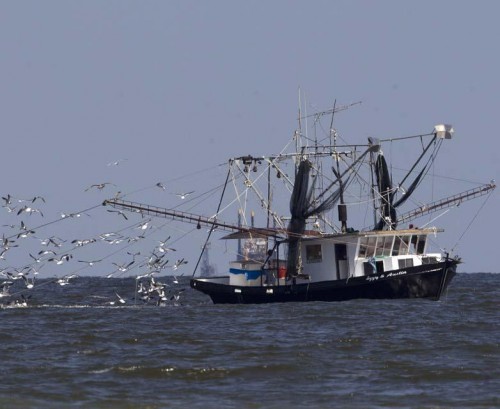
Mansey R. Billiot
June 21, 2011
Eugene Valentine Sr.
June 23, 2011Members of the Louisiana Shrimp Association intend to dock their vessels today and trawl for legislative support outside the state capitol building in Baton Rouge. At issue are low market prices and a federal government push requiring the use of Turtle Excluder Devices on shrimping nets.
On Thursday, more than 300 shrimpers met in Belle Chasse to rally against a list of arguments and accusations they contend have been imposed on them following the BP Deepwater Horizon explosion and oil spill of April 20, 2010.
A primary concern among shrimpers is the low market prices they have experienced this season.
‘Before the oil spill [prices on] 80 to 100 shrimp was $1.20 a pound, LSA Executive Vice President and commercial shrimper Acy Cooper said. ‘After the oil spill and this year it is 25 cents a pound.
Cooper said part of the problem is public perception, outside of shrimp producing states, that all seafood had been contaminated due to the oil spill. In turn, the lack of demand for Gulf shrimp a year after the disaster caused prices to plunge. That is a matter upon which even fishermen disagree, but one the LSA contends is a marketing measure that state officials could combat.
‘Prices are lower than they have been, Mariah Jade Shrimp Co. owner Kimberly Chauvin said. From her office in lower Terrebonne Parish, Chauvin blamed the price crash not only on the oil spill, but also on BP Claims Administrator Kenneth Feinberg. ‘Until BP steps up to the plate and starts paying the industry what it truly lost, I think we are going to continue in this manner.
Shrimpers have wanted Feinberg to pay them for their losses during the past year. Instead, they contend, industry members have received empty promises and token buyouts.
There is no official tally of what the shrimp industry has lost during the past year, but Cooper confirmed it to be in the billions of dollars. That is an amount he and other shrimpers doubt will ever be recovered.
Part of the problem, Cooper said, was that although prices have taken a dive, expenses remain high with the average cost just to leave a dock for one day amounting to approximately $500. That expense easily soars higher the longer a fishing excursion lasts.
‘This use to be a $2.6 billion industry, Cooper said. ‘Now we are a $1 billion industry. People don’t want to eat our shrimp and it is BP’s fault.
According to statistics listed by the LSA, the January through April shrimp harvest of all species yielded 3.4 million pounds this year. That amount is significantly higher than the 2.4 million pounds harvested during the same time in 2010, but is still 27 percent lower than harvest levels during 2008. Cooper noted that when market prices fail to meet expenses, it matters little how much was caught throughout the previous year.
Another issue in their battle is the federally proposed requirement that all shrimpers use TEDs. A TED is a grid of bars with an opening at either the top or bottom of a troll net. The grid is designed to let small creatures like shrimp to pass through while protecting larger marine animals like sea turtles from becoming entrapped in the net.
‘[With a TED] you have a 71-inch hole in your net with a 50 degree angle on it, Cooper said. ‘When the turtle goes down the net, it opens like a trap door and shoots it out. It allows them to escape [along with] 20 to 30 percent of our catch. If you make $100,000 a year and lose 20 percent of your catch that’s $20,000.
While environmentalists and federal agencies have blamed shrimpers for the deaths of hundreds of turtles, Cooper and other members of his industry contend that they are not the problem. They also claim that the TED means reduced production levels for them.
‘There is no data showing that we are the ones killing turtles, Cooper said. He blamed the oil spill and dispersants for the finding of dead turtles along Gulf coastlines.
While Chauvin said she supports the efforts of her fellow shrimpers, she has doubts on how effective taking a day to protest in Baton Rouge might be.
‘I don’t know what it will accomplish because there is no money in the industry, Chauvin said. ‘I wish our lawmakers, federal and state, would get with Feinberg, [because] until the money gets into the hands of people that took losses we are sitting ducks. People will take advantage of the shrimp industry.
‘The oil spill happened so they passed the bill on to us, Cooper said.
Chauvin said that under capitalization and having their industry halted in 2010 hurt shrimpers the most. Cooper said imposed regulations would only cause greater harm. Neither could predict what gains might be made from today’s planned protest.
Louisiana shrimpers are making their presence and their value to the state economy known to elected officials. Their livelihood is being threatened by reduced market prices and increased government regulations. THE ASSOCIATED PRESS










